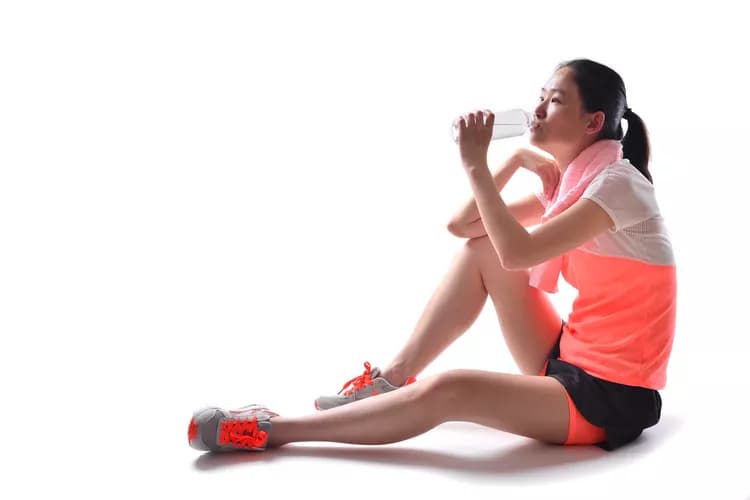After a grueling workout, we feel pain and stiffness in our muscles for several minutes to sometimes days. This is called delayed onset muscle soreness (DOMS) or muscle fever. If the exercise is repeated, then the muscles adapt quickly to prevent muscle damage and soreness. Everyone has experienced and loathed it, whether it is the result of intense weight training or aerobic exercise.
Muscle recovery happens when the muscles continue to remove metabolic waste products (e.g., lactate and hydrogen ions) after strenuous exercise. There are no ways to speed up the muscle recovery process, but there are ways to reduce the feeling of soreness. Some factors that affect the person’s recovery rate include the following: Muscle soreness and weakness, poor exercise performance, decrease in appetite, quantity of sleep, and stomach abnormalities.
Eccentric (lengthening) contractions of the muscle cause the most soreness. This is followed by isometric exercises (static), then concentric or shortening of the muscles. Scientists are still trying to understand the mechanism of delayed onset muscle soreness, but they believe that the pain is a result of micro-trauma or very miniscule mechanical damage to the muscles being exercised.
Here are some ways to help your body recover in a more peaceful manner:
1. Get plenty of rest:
Resting is just as, if not more, important than the exercise itself. Sleep is an active biological activity that you undertake. Your muscles begin to restore during non-REM sleep when your blood pressure drops and your breathing becomes deeper and slower. The blood supply of oxygen and nutrients to your muscles increase, which facilitate their healing and growth. With the extra nutrients, your body rejuvenates your muscles and tissues, and new cells are formed. The National Sleep Foundation's sleep guidelines suggest seven to nine hours of sleep for the average adult.
2. Keep yourself hydrated:
Dr. Robert Wolfe and colleagues showed that eating 100 grams of carbohydrates after exercise can modestly improve muscle recovery. Adding protein to your diet can also enhance these effects.
3. Keep an eye on what you eat:
Eating a two to one ratio of carbohydrates to protein either before or after a workout, or both, could help reduce the severity of muscle soreness and fast track workout recovery.
4. Try massage therapy:
Dr. Weerapong and colleagues in 2013 surprisingly reported that massages reduce delayed onset muscle soreness. Currently, there is an on-going debate on this because other studies find this effect inconclusive. In addition, note that the mental benefits of massage toward recovery are very meaningful to people who exercise.
The amount of recovery time depends on a few variables such as the fitness level, volume, and intensity of the exercise, and familiarity with the exercise. For some people who are novices to this type of exercise routine, they may need a week to recover, while more seasoned fitness fanatics may need only about 48 hours.
Additional Resources:
Børsheim, E., Cree, M. G., Tipton, K. D., Elliott, T. A., Aarsland, A., & Wolfe, R. R. (2004). Effect of carbohydrate intake on net muscle protein synthesis during recovery from resistance exercise. Journal of Applied Physiology, 96(2), 674-678.
Bishop, P. A., Jones, E., & Woods, A. K. (2008). Recovery from training: a brief review: brief review. The Journal of Strength & Conditioning Research, 22(3), 1015-1024.
Dattilo, M., Antunes, H. K. M., Medeiros, A., Neto, M. M., Souza, H. S., Tufik, S., & De Mello, M. T. (2011). Sleep and muscle recovery: endocrinological and molecular basis for a new and promising hypothesis. Medical hypotheses,77(2), 220-222.
Groen, B., Pennings, B. A. R. T., Beelen, M., Wallis, G. A., Gijsen, A. P., Senden, J. M., & Van Loon, L. J. (2012). Protein ingestion before sleep improves postexercise overnight recovery. Medicine and science in sports and exercise, 44(8), 1560-1569.
Gleeson, M. (2002). Biochemical and immunological markers of over-training.Journal of sports science & medicine, 1(2), 31.
Nosaka, K., Clarkson, P. M., McGuiggin, M. E., & Byrne, J. M. (1991). Time course of muscle adaptation after high force eccentric exercise. European journal of applied physiology and occupational physiology, 63(1), 70-76.
Nosaka, K. A. Z. U. N. O. R. I., & Newton, M. I. K. E. (2002). Concentric or eccentric training effect on eccentric exercise-induced muscle damage.Medicine and science in sports and exercise, 34(1), 63-69.
Weerapong, P., & Kolt, G. S. (2005). The mechanisms of massage and effects on performance, muscle recovery and injury prevention. Sports Medicine, 35(3), 235-256.
Helpful Peer-Reviewed Medical Articles:
Vivekananthan, D. P., Blackstone, E. H., Pothier, C. E., & Lauer, M. S. (2003). Heart rate recovery after exercise is apredictor of mortality, independent of the angiographic severity of coronary disease. Journal of the American College of Cardiology, 42(5), 831-838.
Maughan, R. J., & Shirreffs, S. M. (2004). Rehydration and recovery after exercise. Science & sports, 19(5), 234-238.
Du, N., Bai, S., Oguri, K., Kato, Y., Matsumoto, I., Kawase, H., & Matsuoka, T. (2005). Heart rate recovery after exercise and neural regulation of heart rate variability in 30-40 year old female marathon runners. J Sports Sci Med, 4(1), 9-17.
Nanas, S., Anastasiou-Nana, M., Dimopoulos, S., Sakellariou, D., Alexopoulos, G., Kapsimalakou, S., ... & Nanas, J. (2006). Early heart rate recovery after exercise predicts mortality in patients with chronic heart failure. International journal of cardiology, 110(3), 393-400.
Jae, S. Y., Carnethon, M. R., Heffernan, K. S., Choi, Y. H., Lee, M. K., Park, W. H., & Fernhall, B. (2008). Slow heart rate recovery after exercise is associated with carotid atherosclerosis. Atherosclerosis, 196(1), 256-261.
Shirreffs, S. M., & Maughan, R. J. (2000). Rehydration and recovery of fluid balance after exercise. Exercise and sport sciences reviews, 28(1), 27-32.
Related Articles
Test Your Knowledge
Asked by users
Related Centers
Related Specialties
Related Physicians
Related Procedures
Related Resources
Join DoveHubs
and connect with fellow professionals


0 Comments
Please log in to post a comment.